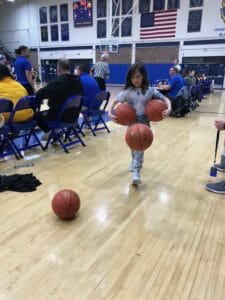
What is your mindset, your attitude, your approach for the new year?
Note I didn’t ask about your goal or your resolution. We all know that they are often broken by month’s end.
As with many of my blogs, here I gain inspiration from my family, and in this case a story from another parent about my 8-year-old daughter, Emmy.
Her newest inspiration, likely rooted in wanting to spend more time with big sis Kathryn, is to be the world’s best ball girl for the high school basketball team, which Dad coaches.
Tuesday evening she had completed warm ups, filled the water glasses, passed them out, made her rounds on the bench for hugs and words of inspiration, written up key plays on her dry erase board, and with 7:43 left in the third quarter the team was up 28-27!
In an attempt to keep her, “What can I do next?” attitude in check, while still coaching a game, her father asked her to gather up all the loose balls from half time and put them back on the racks at the other end of the gym.
This will keep her occupied for a while, right?
Nope.
The next morning I received the most classic Emmy picture from a parent. She was holding two basketballs and kicking two at the same time.

Check, check, check, check. Job done! Now what’s next?
My point of this whole story is that in our day-to-day work, time with patients, and moments with their family members and loved ones, we have a choice. We can go through the motions, get the job done, and do it well in many cases.
Or we can change our approaches in incremental, but impactful, ways to make bigger differences, accomplish more every day, and truly be team players in this big game of improving lives in post-acute care.
That’s right: The post-acute care spectrum in the truest sense is a team sport.
There is, of course, a spectrum in post-acute care for a reason. Inpatient rehab (IRF) differs from long-term acute care hospitals (LTACH), which differ from skilled nursing (SNF), which differs from home health (HH).
Appreciating the role of each team and how we can maintain and improve abilities as those we serve move from one to another is essential.
What we accomplish when it comes to individual setting progress or functional gains, and time spent in lessons we teach to help our patients gain a greater understanding of their conditions and complexities across each care setting, is only truly fully achieved when we communicate effectively with the rest of the team.
In closing, I challenge you to ask yourself: How can I improve my game in 2023? Additionally, as a true team player, how can I assist others in the new year and beyond?
Put me in coach! It’s 2023, and being a team player is the name of the game.
Renee Kinder, MS, CCC-SLP, RAC-CT, is Executive Vice President of Clinical Services for Broad River Rehab. Additionally, she serves as a member of American Speech Language Hearing Association’s (ASHA) Healthcare and Economics Committee, is a member of the University of Kentucky College of Medicine community faculty and is an advisor to the American Medical Association’s Current Procedural Terminology CPT® Editorial Panel. She can be reached at [email protected].
The opinions expressed in McKnight’s Long-Term Care News guest submissions are the author’s and are not necessarily those of McKnight’s Long-Term Care News or its editors.




